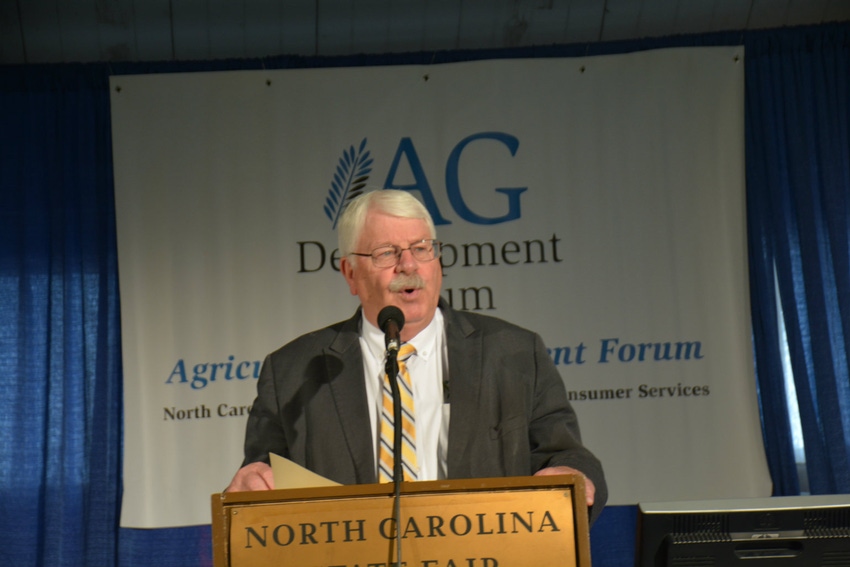
Agriculture Commissioner Steve Troxler hopes 2020 is the year things turn around for North Carolina agriculture. The state’s farmers are coming off some very challenging years.
“When I said hardship, I should have said extreme hardship. I know that in all of my years in agriculture I’ve never seen anything quite like it. Nothing but our farmer’s perseverance and hard work has gotten them through it,” Troxler said in the State of North Carolina Agriculture address at the Ag Development Forum held at the Southern Farm Show at the State Fairgrounds in Raleigh.
Troxler sees real opportunity ahead as the world population continues to grow. The challenge is to position North Carolina agriculture to take advantage of the opportunity. “We’ve tried our best to help farmers get through the rough times so they can be in a position to produce the food and fiber and fuel for world needs as demand grows,” Troxler said.
The challenges are real. Troxler said estimates put farm bankruptcies at 16 in North Carolina due to the farm downturn and the devastation of Hurricanes Florence and Michael in 2018. Both storms came at the worst possible time for North Carolina agriculture, Florence in September and Michael in October.
The devastation could have been far worse if it weren’t for the disaster relief package that was approved unanimously by the North Carolina General Assembly and signed by Gov. Roy Cooper on Dec. 4, 2018. “We have invested in farmers in North Carolina by helping keep them afloat through the bad times to the future,” Troxler said of the package.
“I think I saw something happen that was almost unprecedented with the ag disaster relief program approved. Not only did they (the North Carolina General Assembly) approve the $240 million, but it was a unanimous vote all the way through the process and the governor signed it. I think about the politically charged environment we live in. How many times does that happen? I think this was a watershed moment for North Carolina,” Troxler said.
“After the measure was approved, I think the hard part began. To put it in perspective, we had 7,700 applications from 77 counties in North Carolina that were declared either federal or secretarial disasters, 77 out of 100 counties,” he added.
The $240 million is now in farmers’ bank accounts. The last of the checks went out the Friday before the Feb. 6 forum. Troxler said his department designed a program that was effective, efficient and quickly administered.
He credited the employees of his department, the support of farm and commodity groups and the help of Cooperative Extension and USDA’s Farm Service Agency that provided the information the department needed to get the checks to farmers across the state. “It was a big task, but one that we took on as a state and made it work,” Troxler said.
Damage from Hurricanes Florence and Michael to North Carolina agriculture is estimated at $1.2 billion. Troxler said the $240 million did help famers get from point A to Point B.
Beyond doubt, the $240 million infusion is good for North Carolina’s largest industry and good for rural communities. Both Republicans and Democrats can agree that it is money well spent to help North Carolina farmers succeed in their mission to feed a hungry world.
It’s wishful thinking on my part, but it would be nice if the powers that be in Washington were as unified for good as North Carolina agriculture is unified for good. Sadly, that is one wish that will never come true.
About the Author(s)
You May Also Like






